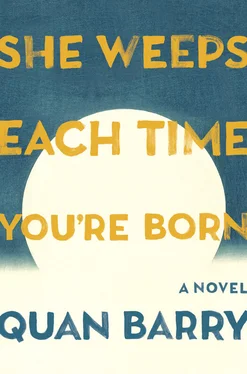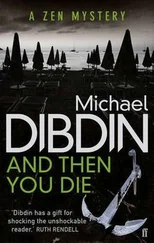As she entered the yard, she could see the door was open. Inside, a fire was burning in the fire pit, but the room was empty except for their few possessions — some cooking utensils and a pair of rice bowls stacked on a small table, Bà’s hammock strung up under the window. The tin bucket they used to collect water from the creek on the other side of the orchard was missing, a ring left in the dirt where the bucket usually sat. Little Mother picked up her sleeping mat and unrolled it on the floor. Slowly she eased herself down and took off her non la . The money was there, but the flower was gone, its little pink bud like a mouth. She took a deep breath and held the hat up to the fire, searching it with her eyes for the words Tu had paid for, had chosen just for her, and how the artist had painstakingly woven them through the lining. In the long river, fish swim off without a trace . How the local people believed that a girl who wore a conical hat laced with poetry would become milder, more gentle, the girl effectively domesticated. Like a water buffalo when the farmer takes her newborn — how in her mourning for her baby, the water buffalo will do anything the farmer asks.
Little Mother could feel the hole where her heart should be. The poem was gone, the writing rubbed out from sweat and the daily friction of her head. Who tends the paddy / repairs the dike? She considered going back out into the fading light, the mosquitoes beginning to swarm, maybe even going all the way to the river to look for the missing flower she had been entrusted with, but outside the visible world exploded and the first pain hit.
Bà tottered back into the hut carrying the tin bucket. Outside the sound of the burning sky roared overhead. She put the water down next to the fire and stood still for a moment taking in the scene with her remaining senses, her eyes gray with twilight. I knew the old man wouldn’t disappoint us, she said. Quickly she hustled back outside to collect more firewood.
Left alone, Little Mother didn’t cry out as her water sluiced down her legs and into the dirt. On all fours she made her way to the door. She wanted to see the mountains one last time. From the doorway they looked like a python after it has eaten a full-size animal. The dream was over, the heat of his hand on her leg. Already the memory of blue flames dancing on the mountainside was fading.
Their last night together she and Tu had sat staring off at the mountains. On the closest slope they could see a handful of blue lights twinkling. She’d sat back and waited. He was always telling her the most beautiful stories, transforming the world before her eyes. Tu cleared his throat. We all carry a light inside us, he said. He told her they were little blue fountains of flame where someone had died and gone unburied, the body’s gases escaping into the air. In the distance she could make out four of them, the fires like indigo stars twinkling on the mountainside. Wandering ghosts, Tu said. Briefly he touched her knee. If you meet one, address it as anh or chi , he said. Brother Ghost. Sister Phantom. She nodded, her young face filled with seriousness.
Little Mother closed her eyes. Pain radiated through her body. She could still see the bright red birthmark on the edge of Tu’s hairline, the mark shaped like a diamond. At times it seemed to change with his feelings, the color deepening as an emotion took hold of him. She would never see him again in this world. She crawled back to the fire and collapsed.
When she opened her eyes again, it was night, the air sulfurous and filled with thunder and lightning. Each time one hit, brightness like hell itself. She could feel the earth tremble, the one-room hut quivering as bits of dried thatch rained down from the roof, the splintery wooden boards rattling like teeth. On her mat in front of the fire pit she imagined what kind of world the planes came from, a land of fire and iron, liquid light, pain and the quiet that comes after. She tried to remember even the smallest scrap of her favorite dream, the heat of his hand on her leg, but all she could recollect was a cacophony of doors swinging wildly in a thrashing wind, the sound of their hinges like broken jaws. It was the only dream she ever had anymore.
There was a piece of rope and a knife and an old gunnysack laid out on the floor. Bà had the fire going strong, her eyes red in the light. The old woman lay smoking her pipe in her hammock by the window. The pipe was carved from an animal’s thigh bone, the bowl itself the head of a dragon. Each time Bà inhaled, the creature’s eyes burned as if alive. Little Mother knew that when the time came to act, Bà would fly into motion. They never talked about it, how Bà’s eyes had soured in the last year, everything gone but light itself, though it didn’t seem to slow her down any. The old woman was as she had always been. Up each morning before the sun’s first rays, then doing the things that needed doing.
Bà tapped her ashes into a tin can. He will come, she said. The old woman had a way of knowing things she shouldn’t know. Something hit the earth. A jar of nuoc mam fell off a shelf, the glass cracking on impact. It was the closest one they had ever felt, the thing as close as a mile away. The smell of fish drifted through the room. Even now he is on his way, said Bà, smoke shirring around her head.
Two rats came out of the darkness and stopped at the spot where the nuoc mam had fallen. Little Mother turned her head and watched them scratch at the dirt. Then another one hit, the power of a thousand tons lifting her body clean off the floor. One of the rats paused and looked at her. There was no fear in its eyes. Little Mother wondered if she were already among the dead. Finally the animal turned and along with the other scurried out of her line of sight.
In many ways the pain was just like the mosquito sickness, a burning all throughout her body. She would wake for a few minutes, a few brief images limned with each explosion — Bà stoking the flames, Bà fanning Little Mother with her straw hat, the night as if immolating itself, outside the sugar apples bursting on the bough — and then she would fall back into darkness. She could feel a door creaking open in her body. The circular bruises on her skin throbbed as if gasping for air.
A few hours past midnight they ran out of wood. There were hardly any rice husks left to burn. We need to save what we have, Bà told her. And so they sat in the dark, her body’s doors opening at a glacial pace, like something fermenting. Outside the world going up in flame.
Toward morning Bà awoke when something landed on her face. The dawn was silent, no animal noises stirring in the growing light. The old woman was sitting in the doorway, her pipe cold in her hand. She could feel the first rays of the morning sun just coming over the mountain and struggling to break through the smoky haze.
Bà touched her cheek where the thing had landed soft as a moth. Another landed on her neck. It was coming down. She could hear it hitting the earth, each one alighting faint as paper. One landed in the middle of her forehead. She wiped it off and smelled her fingers. It was ash. The little round scar on her chest next to her heart began to grow hot. Little Mother, she said.
Later the sound of an engine coming through the orchard. Bà turns her head toward the noise. For the first time she is conscious of the gray lace glazing her eyes. She wipes her face with the backs of her hands. There is so much to do.
They were walking through the orchard. Judging from his smell, the first boy who arrived wasn’t an American, his body as if wrapped in rotten leaves. Bà took another deep breath in through her nose. He wasn’t Vietnamese either, not a northerner or a southerner, not even one of the ethnics from the mountains. She heard him call to the others, words like the barking of dogs. How many she didn’t know, hundreds of thousands or just a handful, and all of them coming to where the first soldier had called them. Bà could hear the fatigue in their voices, the swinging of their heavy guns against their gaunt bodies. The sun trickled in from the east through the dark man-made clouds.
Читать дальше












